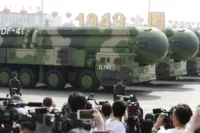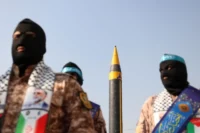
The world must reject Russia’s nuclear posturing – but not ignore the danger
Frustrated by the precarious state of Ukraine’s war effort and the long delays in US aid, leaders in France and Britain have stepped up their promises to Ukraine in the last few days. The French president, Emmanuel Macron, repeated in an interview last week that he might send ground forces to shore up beleaguered Ukrainian defenses. Meanwhile, speaking in Kyiv, the British foreign minister, David Cameron, gave Ukraine the green light to strike into Russian territory, clearly signaling that the UK wants a more aggressive approach to the war.
Their frustration is understandable, as is the temptation to get more directly involved in the war, with more powerful weapons and more guarantees of long-term backing for Ukraine.… Seguir leyendo »



















